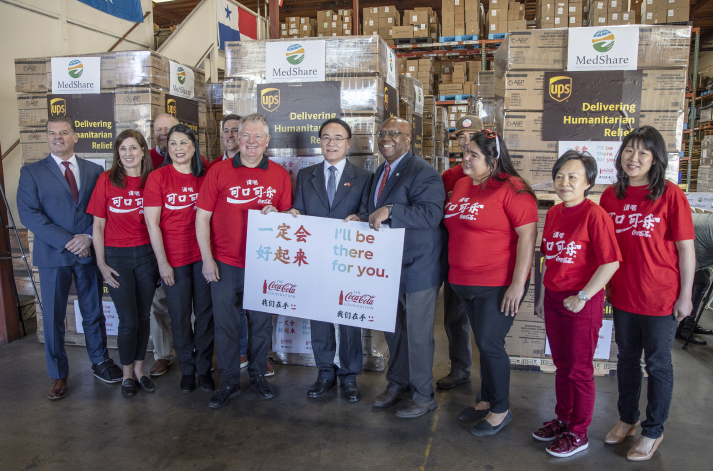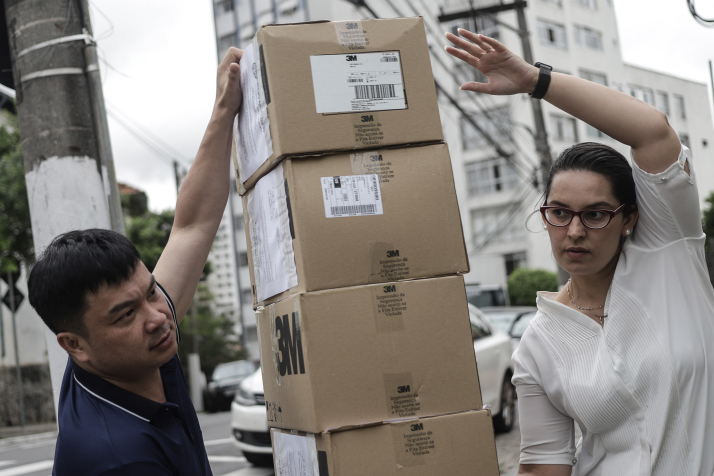| Voice |
| Dangers of Decoupling Amid the Virus | |
| Isolationism should not overshadow concern and generosity in the face of the novel coronavirus epidemic | |
|
|
 U.S. non-profit Medshare unveils donations of medical supplies in San Leandro, California, on February 10, to aid China's ongoing fight against the novel coronavirus (CNSPHOTO)
National and international containment strategies have unfolded quickly—some quite reasonable, others less so, but all fundamentally reactionary—and the economic costs to China and the rest of the world are still unknown but a cause for serious concern. For these reasons and others, the geopolitical knock-on effects likewise are matters that require sober reflection. Simplistic thinking While some economic analysts optimistically point to mid-March as a possible inflection point, it would be a mistake to think that everything can or should return to business as usual. On the one hand, while containment and treatment efforts appear to be working, this epidemic is still active. On the other hand, given the generally negative trend of U.S.-China relations, characterized by some in Washington as a new era of great power competition or worse, the Cold War 2.0, returning to business as usual would be undesirable and even unhealthy. As some have quietly noted, the impacts on global transportation and supply chains are providing a glimpse of what decoupling might look like. Decoupling is the term that some in Washington and elsewhere have used to describe their vision of future U.S.-China relations, with rhetoric and policies recalling those in play during the Cold War between the U.S. and the USSR. Stripping off the polite veneers of diplomatic discourse, the ahistorically constructed and crudely imagined ambitions of decoupling are twofold: first, to sustain U.S. global hegemony as much as possible, and second, to create manifold pressures that undermine and destroy China's political system. Unfortunately, in the short term, the outbreak may embolden those promoting decoupling. Their logic is that by cutting ties with China and in some narratives, rebuilding manufacturing in the U.S. and so on, the U.S. position will be protected from potentially adverse economic and health effects, among others. Such simplistic thinking has already driven a deep wedge between the U.S. and China, but it has also been at work elsewhere, including Europe, where its local version is the fool's errand known as Brexit. The narratives that promoted Brexit exploited reasonable anger with unreasonable fantasies, with the actual costs far exceeding promised benefits and creating political instability in the UK, including upsetting relatively precarious relations with Scotland and Northern Ireland, and more recently, in Ireland itself, if the recent electoral gains of Sinn Fein are a reliable indicator. While some say that decoupling is already underway, the idea that one can simply decouple is ludicrous, and all the more so between China and the U.S. and the broader global economy. In fact, coupling between the U.S. and China has been underway since 1979 at least, and arguably, since the Nixon-Kissinger visits in the early 1970s. Today, bilateral trade and investment between the U.S. and China, and between China and those the U.S. counts as its closest allies, as well as other forms of exchanges, are calculated in trillions of dollars and affect billions of people. In economic terms alone, to cleave relations would be tantamount to slitting one's own throat as well as that of a large percentage of the world's population at a time when global dangers like climate change and disease outbreaks require more coordination and mutual goodwill. In fact, while we do not know all of the conditions that led to the current outbreak, we should not be surprised if we discover that problems like climate change and the U.S.-China trade war are cofactors. Global warming has already been linked scientifically to increasing global burdens of disease, including previous outbreaks like the severe acute respiratory syndrome, with associated morbidity and mortality expected to surge dramatically over the coming decade. This is on top of other impacts driven by volatile weather, rising sea levels, contaminated drinking water and so on. Additionally, while it might not be the case that the U.S.-China trade war had a direct role in the outbreak, it has certainly contributed to difficulties in certain economic sectors in China preceding it and has undermined, according to some reports, efforts to organize U.S. support on China's behalf. Those who look positively at the containments associated with the epidemic as a dry run of decoupling should be wary of the response: a wet cough.  Staff members load epidemic control materials donated to China by locals in São Paulo, Brazil, on February 4 (XINHUA)
A tough test There is some concern that this outbreak might already be a tipping point for a global economic recession. While some analysts believe the containment in China has been effective, a global pandemic would create greater catastrophe. The simple-minded calculators in Washington and London may yearn for the return of the Cold War, of a sharply divided world, including, in the British eurosceptic case, divisions in Europe and especially Germany, but Earth is warmer now, China's population and global economic position are much larger than the Soviet Union's, and the global costs of decoupling, in terms of both economics and human health, are exponentially higher. This is keeping in mind that numerous studies have shown that the rapid collapse of the USSR had incredibly negative health impacts on millions in Russia and beyond, including higher infant mortality rates, increased alcoholism, increased infectious and chronic disease deaths, and significant decreases in life expectancy. Unfortunately, China is a soft target for global climate change, disease outbreaks and racism. Given its dense cities and heavily burdened health systems, coupled with its global economic integration and advanced transportation and logistics, China needs to do a better job preparing for and responding to disease outbreaks. It needs to reassure itself and the world that it has done so. Of course, the Chinese system, like all systems, has its strengths and weaknesses, and the epidemic is testing these; but it is also testing the global system and fueling those who believe that dismantling it provides a reasonable path forward. And to be sure, there is more than a tinge of racism underlying some of these designs, as China's rise was already strongly correlated with increasing Sinophobia and new forms of Orientalism prior to the outbreak. While many Chinese people today are rightly offended by the many instances of insensitivity and racism directed at them, particularly during this outbreak, they should not let this fuel their own xenophobia. Indeed, there are some in China who also harbor isolationist fantasies. These developments, while unacceptable and destructive, should not overshadow the incredible concern and generosity shown by Chinese and non-Chinese alike in the face of this epidemic, nor should they feed the mutually destructive fantasies of decoupling and a new Cold War. The lesson this outbreak teaches us, whether we like it or not, is that we are all in this together. The author is professor of politics and director of the International Graduate Program in Politics at East China Normal University in Shanghai Comments to yanwei@bjreview.com |
|
||||||||||||||||||||||||||||
|